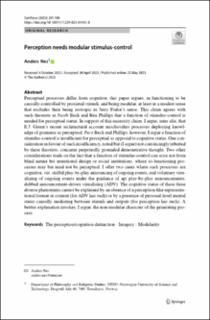Perception needs modular stimulus-control
Peer reviewed, Journal article
Published version
Permanent lenke
https://hdl.handle.net/11250/3107451Utgivelsesdato
2023Metadata
Vis full innførselSamlinger
Originalversjon
10.1007/s11229-023-04181-8Sammendrag
Perceptual processes differ from cognitive, this paper argues, in functioning to be causally controlled by proximal stimuli, and being modular, at least in a modest sense that excludes their being isotropic in Jerry Fodor's sense. This claim agrees with such theorists as Jacob Beck and Ben Phillips that a function of stimulus-control is needed for perceptual status. In support of this necessity claim, I argue, inter alia, that E.J. Green's recent architectural account misclassifies processes deploying knowledge of grammar as perceptual. Pace Beck and Phillips, however, I argue a function of stimulus-control is insufficient for perceptual as opposed to cognitive status. One consideration in favour of such insufficiency, noted but (I argue) not convincingly rebutted by these theorists, concerns perpetually grounded demonstrative thought. Two other considerations trade on the fact that a function of stimulus-control can arise not from blind nature but intentional design or social institutions, where so-functioning processes may but need not be perceptual. I offer two cases where such processes are cognitive, viz. skilful play-by-play announcing of ongoing events, and voluntary visualizing of ongoing events under the guidance of apt play-by-play announcements, dubbed announcement-driven visualizing (ADV). The cognitive status of these three diverse phenomena cannot be explained by an absence of a perception-like representational format or content (for ADV has such) or by a presence of personal-level mental states causally mediating between stimuli and outputs (for perception has such). A bettter explanation invokes, I argue, the non-modular character of the generating process.

